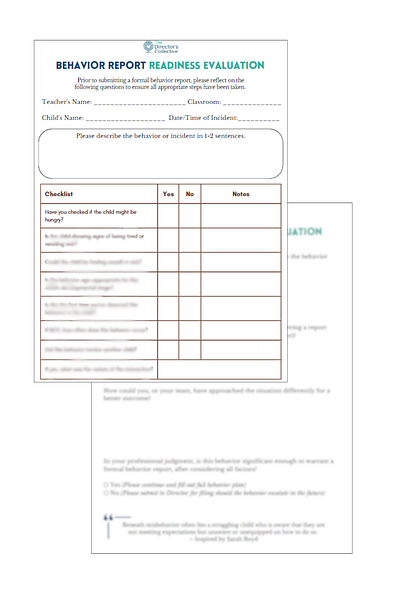Behavior Report Pre-Evaluation
A simple tool to help your teachers assess classroom behaviors and decide whether a formal behavior report is necessary
We've all experienced situations where it feels like teachers are sending home behavior or incident reports for minor issues. While it's important to support our staff, we also recognize the strain frequent reports can place on parents and families, especially when the incidents aren't as serious as they might seem. That's why I created the Behavior Report - Pre-Evaluation!
The Pre-Evaluation is a new step you can introduce to your team, ensuring that behavior reports are handled thoughtfully and appropriately before they are formally submitted to the director and parents. This form is designed to help teachers reflect on the incident, assess the context, and evaluate whether a formal behavior report is truly necessary.
How to Use the Behavior Report Pre-Evaluation
Teacher Completes the Form Before Deciding on a Formal Behavior Report:
After an incident occurs, teachers should fill out the Pre-Evaluation, taking time to reflect on the key questions. This process will help determine whether the behavior is serious enough to warrant a formal behavior report. The form prompts teachers to assess factors such as the child’s basic needs (hunger, tiredness), the developmental appropriateness of the behavior, and the classroom environment.Decide Whether to Submit a Formal Behavior Report:
If, after completing the form, the teacher concludes that the behavior does not require formal documentation or communication with the parents, the Pre-Evaluation should still be submitted to the director. This ensures that the incident is tracked internally and can be referenced in the future if needed, without elevating it to a formal report prematurely.If a Formal Report is Needed:
If the teacher determines that the behavior is significant and warrants further action, the Pre-Evaluation Form should be submitted along with the formal behavior report to the director. The director will review both documents and decide whether to communicate the behavior to the child's family.Director’s Role in Monitoring:
Whether or not a formal behavior report is generated, the director will review all submitted Pre-Evaluation Forms. This allows for continuous tracking of behaviors, ensuring that patterns or recurring issues can be addressed early on, even if individual incidents do not require immediate communication with parents.
Why You Should Implement This!
Encourages Thoughtful Reflection:
Many behaviors that children display in early childhood settings are developmentally appropriate, even if they seem challenging in the moment. The Pre-Evaluation Form encourages teachers to pause and reflect before escalating a situation. It promotes critical thinking about whether external factors, such as hunger, tiredness, or changes in routine, could have contributed to the behavior.
Reduces Stress for Families:
Receiving frequent behavior reports can be overwhelming for families. If reports are submitted without thorough consideration, parents may feel stressed or believe that their child’s typical development is being misunderstood. This form helps ensure that only significant incidents are communicated to parents, fostering a more trusting and supportive relationship between the school and families.
Supports Professional Judgment:
Teachers are professionals who care deeply about the children in their classrooms. The Pre-Evaluation empowers them to evaluate situations more holistically, ensuring that they have considered all factors before submitting a report. This builds confidence in their own decision-making and ensures that the behavior report process is used effectively.
Guides Director Review:
The director will use the Pre-Evaluation alongside the behavior report to determine the severity of the incident. This helps ensure that only necessary reports are sent home to parents, reducing the risk of over-reporting while maintaining clear communication about truly concerning behaviors.
This process encourages thoughtful handling of classroom incidents while ensuring that all behaviors, whether formally reported or not, are considered and tracked over time. Download, print, and start using the Pre-Evaluation below!



